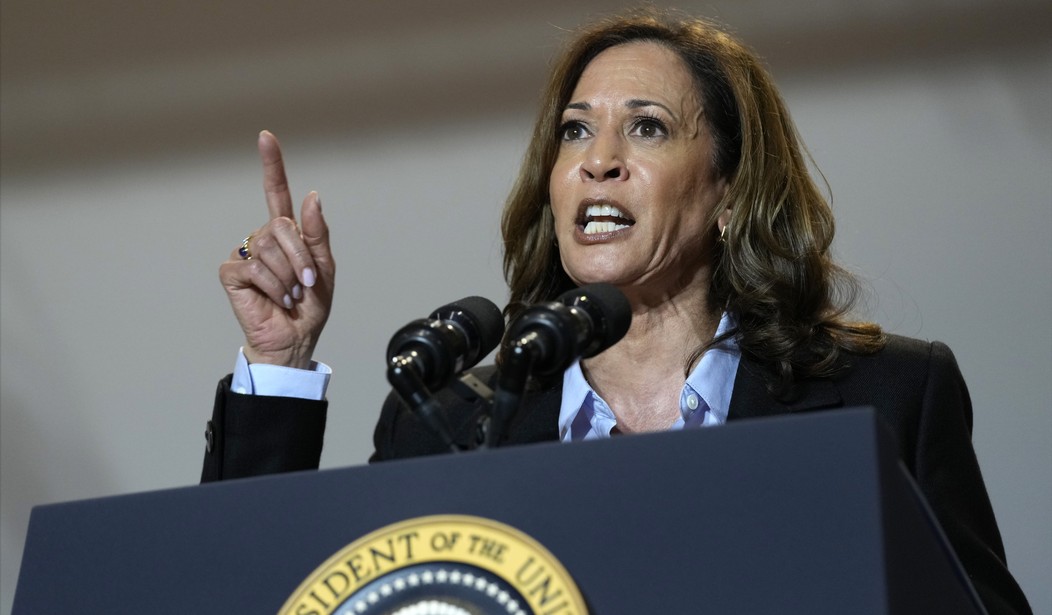Do you know why black Americans have heart disease and high blood pressure? Racism (obviously).
What, you were thinking diet and exercise? Don’t be so naïve! Racism — the answer is always racism.
“You can look at the issue of untreated and undiagnosed trauma,” explained Kamala Harris to NPR host Steve Inskeep. “African Americans have higher rates of heart disease and high blood pressure. …And trauma, undiagnosed and untreated, leads to physiological outcomes.”
In a Harris-controlled White House, reparations for slavery won’t just be a moral issue, a legal issue, or even a civil issue — it’ll be classified under healthcare.
And what role does Harris believe the federal government should have in healthcare? All you need to know is that then-Sen. Harris was the cosponsor of Sen. Bernie Sanders’ ultra-radical “Medicare for all” bill. As Stan Lee used to say, “‘Nuff said.”
In politics, there’s the left, there’s the middle, and there’s the right. Harris's position isn’t just to the left; it’s so far to the left that even liberal Democrats were taken aback. “I don’t want to guess what [Harris is] thinking but that is a massive part of the American economy,” said Sen. Dick Durbin. “It would take a mighty transition to move from where we are to that.”
But Harris disagreed. “I believe the solution — and I actually feel very strongly about this — is that we need to have Medicare-for-all,” she replied when CNN host Jake Tapper asked if she would eliminate private health insurance. “That’s just the bottom line.”
Ban the other choice. It’s actually a similar strategy to how she wrested the Democratic presidential nomination: When you eliminate the other option, you’re the only game in town. And to the Democrats, winning by default still counts. The Pro-Choice party continues to be highly selective about what we’re allowed to choose.
However, the reparations issue is far different than haggling over healthcare or discretionary spending. Healthcare is confusing and complex; it’s not always intuitive who’s telling the truth. Budgetary allotments that go through committee(s) can be worse.
But reparations? You don’t need a scorecard to know who’s on first.
“I think there has to be some form of reparations and we could discuss what that is, but look, we’re looking at more than 200 years of slavery,” said Harris. “We’re looking at almost 100 years of Jim Crow. We’re looking at legalized segregation and in fact segregation on so many levels that exist today based on race… And so we are seeing the effects of all those years play out still today.”
Related: The Kamala Harris Campaign Is Putting Lipstick on a Pig
Reparations and abortion might not seem like policy twins, but they actually share a similar ethos: Both issues are straightforward, understandable, and trigger an emotional response. And strategically, the best way to win an emotional issue is with an emotional argument. When your audience reaches a conclusion via emotions, you can’t change their mind with logic or statistics. You need to respond emotionally — and passionately — when you explain why the other side is wrong.
“Any policy that will benefit black people will benefit all of society,” Kamala Harris explained. “Let’s be clear about that. Let’s really be clear about that. So I’m not going to sit here and say I’m going to do something that’s only going to benefit black people. No. Because whatever benefits that black family will benefit that community and society as a whole and the country.”
Do you follow her argument? Slavery — even though it ended in 1865 (FYI, we fought a pretty big war over it; might wanna gift Harris a book, or something) — is giving black people high blood pressure in 2024, so the government needs to send them money. But don’t worry: even though only black families will get paid, this will help everyone.
It’s a winning argument — within the Democratic Party. Eighty-two percent of Democrats believe slavery still affects black people a great deal or a fair amount; just 29% of Republicans agreed. So, if you were running in the Democratic primaries — which Harris was in 2020 when she took these radical positions — this would help you solidify your support within your base. It’s a smart move.
But outside of the Donkey Party’s “safe space” bubble? Sixty-eight percent of Americans DO NOT support reparations. In fact, only 18% of white Americans support reparations for the descendants of slaves.
Few policy initiatives are LESS popular.
The media likes to hammer Republicans for their “unpopular” stance on abortion. But overall, more Americans think abortion should be illegal than support reparations. (Wonder why the media isn’t reporting that?)
This is a winning issue for Trump.
And the first Trump-Harris debate on Sept. 10 is the perfect time to bring it up.










Join the conversation as a VIP Member